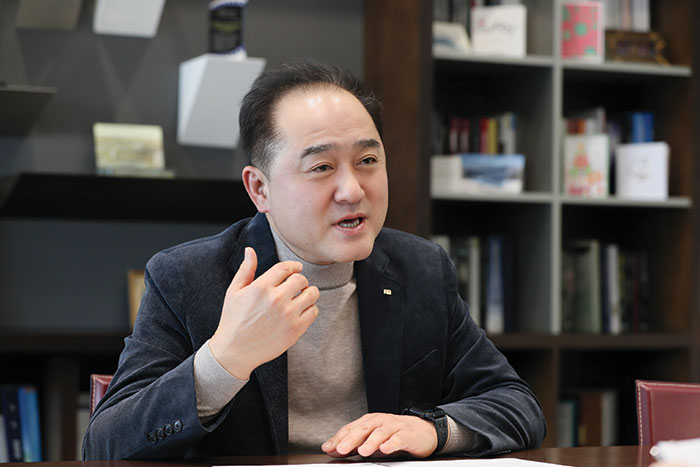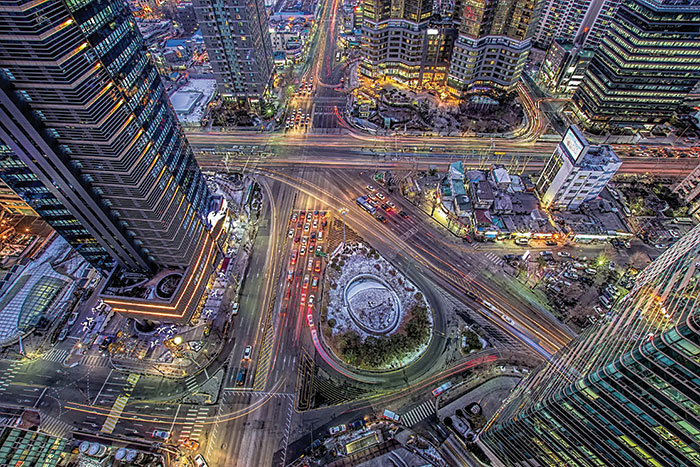2025 Economic Outlook
Q&A: Recent Political and
Economic Events In Korea
Q&A: Recent Political and
Economic Events In Korea

“The Korean economy
remains stable on the basis
of robust fundamentals
and respectable sovereign
credit ratings.”
Unusual political developments have unfolded in Korea since December 2024, prompting some degree of concern within a portion of the international community. That concern has to do with uncertainties about addressing economic challenges to bring stability amid the ongoing state of affairs in which both the President and the Prime Minister of Korea have been impeached. Regarding this matter, we spoke with Chul Chung, president of the Korea Economic Research Institute, a notable figure representing a think tank with private business community affiliations.
Q. What is the state of affairs in Korea since the declaration and lifting of martial law? What do you foresee as happening next?
A. Since the declaration of martial law by the President on December 2 at 22:29, the National Assembly unanimously overturned the decree in just 2 hours. I believe this reflected the vigorous democratic resilience of the Korean society, as constitutional order was restored through legal and democratic procedures. This occured even though the imposition of martial law potentially put the freedoms and rights of the Korean people under threat. Following the passage of the bill to impeach the President, the bill to impeach Prime Minister Ducksoo Han was also passed, and as of this interview, the Deputy Prime Minister and Minister of Economy and Finance Sangmok Choi serves as Acting President.
Currently, constitutional procedures are being followed to return to a normal state of affairs. As the Constitutional Court of Korea is legally required to uphold or overturn an impeachment motion within 180 days, many experts foresee that the impeachment deliberations will be completed before the end of 1H 2025, and a snap election will be held.
Q. What measures are being taken by the Korean government to stabilize the economy? As President of the Korea Economic Research Institute, what advice are you giving to policymakers?
A. The legislature passed the 2025 budget on December 10, 2024. Political developments notwithstanding, planned economic policies are being advanced as a matter of course. For instance, the 2025 Economic Policy Directions was announced shortly after New Year’s Day, which included consumption stimulus measures for spurring domestic demand; investment promotion measures for overseas businesses and investors by raising the cap for cash grant support for investments from 50% to 75%; and expansions to trade finance support for exporting businesses. Weekly heads of finance and economic authorities meetings are being held to review financial and currency market trends, and their first priority is to implement economystabilizing measures.
Through close communications with various actors, including international organizations, global ratings agencies, and foreign investor institutions, my advice to policymakers as President of the Korea Economic Research Institute has been to focus primarily on efforts to retain and improve Korea’s sovereign credit ratings. The policy authorities must underscore that stable economic operations are proactively addressing downside risks and that the Korean economy’s fundamentals remain robust. Also, I am emphasizing that securing future growth drivers is an urgent task to prevent the Korean economy from falling into a prolonged period of low growth below its potential growth rate of 2%. As such, I am also recommending that financial support with an investmentoriented nature be given serious consideration. In addition to deploying traditional fiscal and monetary policies, I have been stressing the importance of making improvements to laws and institutions, such as tax policy and regulatory reforms, to boost economic vitality and stimulate economic activity. I have further argued strongly for sweeping regulatory overhaul as well as implementing bold measures for legal and institutional improvements.
Q. How are Korean businesses responding to this situation and what is the role of FKI as a representative of major corporations?
A. The central agenda of Korean businesses is addressing shifts in the global trade environment, including those arising from the change in administration in the US, and strengthening economic foundations to minimize the effects of political uncertainties on business activities.
The FKI will remain true to our roots of being the voice of business by promoting legal and regulatory reforms necessary for seamlessly carrying forward planned investments and securing future growth engines. In 2025, FKI will also focus on private sector economic diplomacy, which has arisen as a major agenda item. Playing the role of a facilitator, the FKI will help expand business opportunities for Korean businesses and help lay the foundations for mutual growth through close cooperation with our counterparts in other nations, governments, think tanks, and opinion leaders. In crisis lies opportunity. Overcoming the challenges of the current crisis facing the Korean economy requires efforts to unite the Korean people and businesses as one. Going forward, the FKI will transform into a generator (Power House ) of entrepreneurial spirit, spreading and embedding the idea of Kentrepreneurship in everyday life through various forms of campaigns and activities. This will serve to activate entrepreneurship required for securing future growth engines and spread positive awareness of business activities.

“The FKI will remain true to
our roots of being the voice
of business by promoting
legal and regulatory reforms
necessary for seamlessly
carrying forward planned
investments and securing
future growth engines.”
Q. What is your outlook on Korea’s economic growth rate in 2025? What factors do you monitor closely that would influence the Korean economy’s growth rate?
A. I cautiously project that Korea’s economic growth rate for 2025 will be in the high 1% range, a lower figure than pre-COVID-19 pandemic growth rates. This is due mainly to slowdowns in exports due to external uncertainties and sluggish domestic demand. Following the launch of the second Trump administration, if the risks of tariff impositions translate into a rise of protectionism, it would further compound Korea’s economic growth challenges, given its heavy reliance on exports.
However, Korean businesses are competitive globally in future growth driver industries such as semiconductors, electric vehicles, shipbuilding, and the defense industry. If we respond with calm clarity to shifts in the trade environment policy and unleash the spirit of entrepreneurship, we may be able to identify unexpected opportunities. Also, if the domestic political developments are stabilized rapidly, Korea may be able to rebound toward the end of 2025 or in 2026.
Q. What is your general view of the resiliency of the Korean economy amid such political challenges?
A. Despite political developments, the Korean economy remains stable on the basis of robust fundamentals and respectable sovereign credit ratings. Korea holds the ninthlargest foreign exchange reserves globally, totaling $415.6 billion at the end of December 2024 and has sustained robust sovereign credit ratings over the past decade.
Korea is imbued with fortitude for braving serious challenges and has upheld a spirit of cooperation and national unity in times of crisis. Instilled in the Korean people and Korean businesses are historical and recent experiences of emerging from crisis—from Independence Day and throughout the Korean War, to weathering the Asian Financial Crisis and the Global Financial Crisis, and rising to the challenges of COVID-19 as a united whole. It is my view that the Korean legal and administrative system will serve as a stabilizing backdrop that will enable the Korean economy to rise to internal and external challenges, testifying to the resilience of the Korean economy, ultimately serving as an opportunity for the Korean economy to advance one step further.